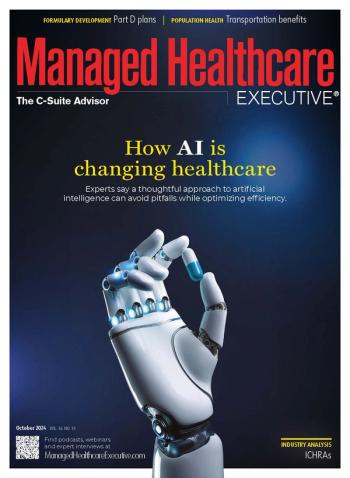
Real-World Applications of Artificial Intelligence in Healthcare
No longer a technology for science fiction, artificial intelligence and machine learning offer the multifaceted approach that healthcare is waiting for.
Artificial intelligence (AI) may sound like something from a science fiction movie, but its uses in healthcare are vast and cutting-edge. From improving patient compliance to finding new ways to achieve cost-effective outcomes, this technology is paving new ground in the value-based care landscape.
“Using artificial intelligence to optimize health outcomes and reduce costs,” presented on October 23 at the Academy of Managed Care Pharmacy (AMCP) Nexus 2018 conference in Orlando, highlighted the vast number of artificial intelligence digital tools that have burst onto the market place in recent years and how those tools can best be used by payers to achieve cost-effective outcomes. Sam Leo, PharmD, director of special clinical programs at Magellan Rx, and Adam Hanina, chief executive officer at AiCure, identified current and emerging technologies, the challenges involved in adopting some of these new technologies, and best practices for applying artificial intelligence to practice.
“From a managed care perspective, artificial intelligence can be a tool that helps us use our resources more efficiently to identify high-risk patients and proactively intervene to prevent a negative and costly outcome before it occurs,” Leo told Managed Healthcare Executive prior to the conference. “Furthermore, it can be used to help improve the overall patient experience and, through that, encourage more healthy behaviors.”
“We are only at the beginning of what can be achieved, in terms of understanding behavioral patterns and how patients respond to treatment, but we are already seeing AI’s potential,” Hanina added. “By implementing AI, we can target the costliest pain points in the patient’s journey, preventing millions of unnecessary complications, hospital readmissions, and reducing time on treatment.”
How AI can be used
In practice, Leo said AI can be used to improve patient outcomes by predicting the likelihood of a future negative outcome, giving healthcare providers or managed care organizations time to intervene.
“From an adherence perspective, certain artificial intelligence tools that interact with patients may also allow us to measure adherence and pill-taking behavior in real-time so we can identify changes in behavior immediately instead of after-the-fact,” Leo said. “Patients may also be able to communicate back with the interfaces of such tools to receive medical education or connect with a healthcare professional.”
“With the shift to value-based care, clinicians feel more pressure than ever to reduce healthcare costs while improving the quality of care. There are many variables that are factored into effectively managing a patient’s care including the severity of disease, available therapies, quality of and access to care, clinical oversight, social determinants of health, and individual patient behavior,” Hanina said. “AI has the potential to radically change how we understand the collective relationship between these factors and the patient experience.”
AI technologies like computer vision and neural networks, which can easily be configured on computers and smartphones, enable clinicians to see and interact with their patients, Hanina said. The technology uses visual cues to assess, interact, and assist patients; can be used to remind patients to take medications; and opens a new path for patients to communicate with providers. For clinicians, AI is a wealth of data that can be used to improve health outcomes and streamline processes. One of the basic applications of AI is to understand whether the therapy is not working or whether it is the patient not adhering to the therapy, Hanina explained.
“Currently, there is no way for managed care organizations, other than reviewing months’ old prescription days covered (PDC) rates, to gauge patient engagement with therapy. Likewise, concerted efforts to measure patient response to treatment based on different drugs is very difficult,” Hanina said. “Both elements can be accomplished through AI and present the opportunity to save managed care millions of dollars in unnecessary spending. Similarly, AI can augment the reach and effectiveness of individual case managers, who frequently are assigned to the highest cost patients. Case managers must rely on fractured datasets that are compiled far from the point of care and are too imprecise to guide effective interventions. The adoption of AI and the insights generated from careful collection of precision data can be a real differentiator for managed care organizations.”
Overcome issues
There are vast options in the AI landscape now-with more than 100 startups focusing on transforming healthcare with AI in 2016 alone-and the key is finding systems that patients can use, that have data security and meet regulatory requirements are other challenges.
“There is no quick or easy way to address these issues, but instead all need to be carefully considered and evaluated before any vast incorporation of new technology or processes,” Hanina said. “AI technologies, first and foremost, should be viewed as a means rather than an end and ultimately be considered valuable new capabilities or tools that we can use rather than as pure decision-making tools.”
As for whether patients are ready to accept artificial intelligence, Leo said this is a question organizations should always assess before rolling out any artificial intelligence tools.
“Investing in an artificial intelligence-based virtual assistant, for example, is not going to provide any value if nobody uses it,” Leo said. “We need to ensure any technology that will affect patients has high usability and ultimately improves their experience.”
Specific to the managed care landscape, Leo said there are innovations in both machine-learning and natural language process technologies that will have managed care applications in decision-making support, predictive analytics, forecasting and budget impact modeling, care management and disease education tools, customer service, and more.
Like most new technologies, though, Hanina warned that AI isn’t a cure-all. Programs must be put into place thoughtfully and supported with good data.
“There is a tendency to think of AI as the magic bullet that will solve all our problems. Collecting and analyzing large datasets is only as good as the quality of the data entered and the thoughtfulness of the algorithms developed,” Hanina cautioned. “There is a tendency to forget about the complexity of human nature, a complexity that becomes even more unpredictable when you add disease into the equation. Organizations need to approach new technology carefully. Just like a new drug, it needs to be validated and demonstrate a clear ROI. If the AI application is not supported by a strong evidence base and cannot show clear impact on clinical outcomes, the value proposition is greatly reduced.”
Rachael Zimlich, RN, is a writer in Columbia Station, Ohio.
Newsletter
Get the latest industry news, event updates, and more from Managed healthcare Executive.























